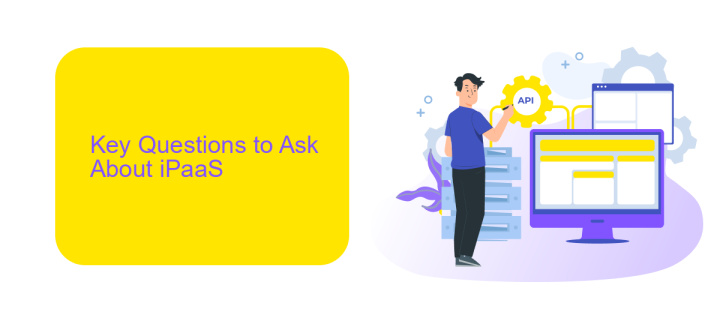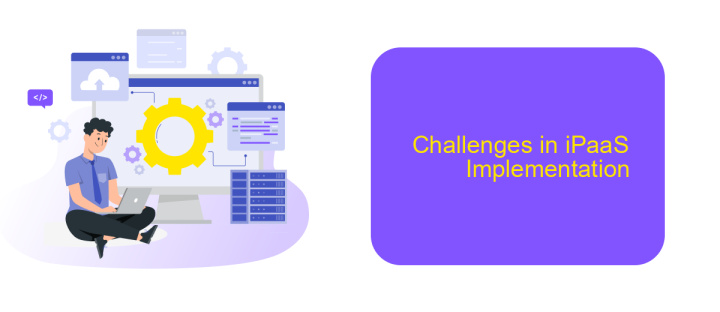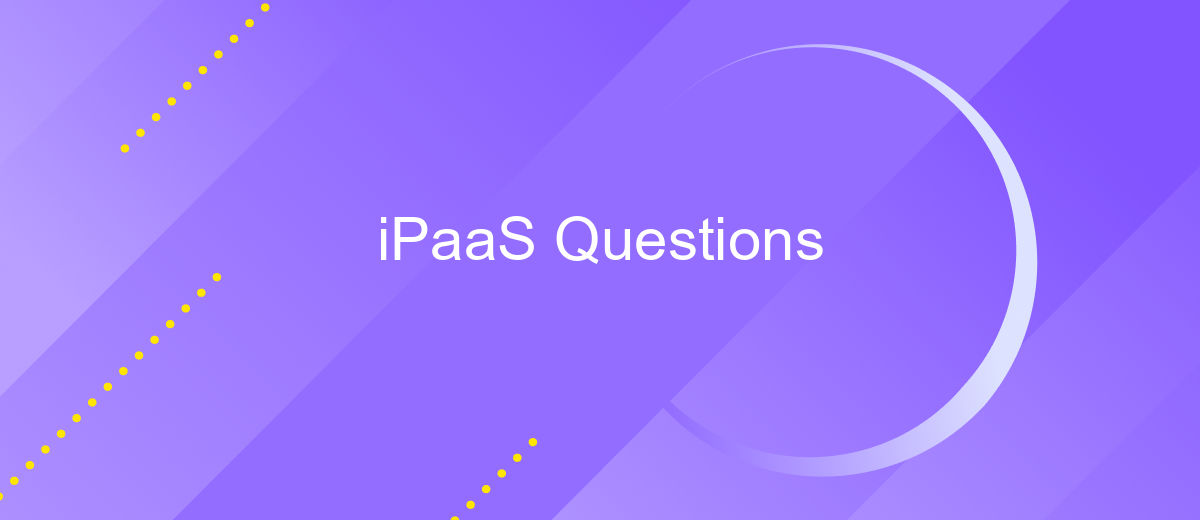iPaaS Questions
In today's rapidly evolving digital landscape, Integration Platform as a Service (iPaaS) has become a critical tool for businesses looking to streamline their operations and enhance connectivity. This article addresses some of the most frequently asked questions about iPaaS, providing insights into its benefits, implementation challenges, and best practices to help you make informed decisions for your organization.
Introduction
In today's rapidly evolving digital landscape, businesses are increasingly relying on Integration Platform as a Service (iPaaS) solutions to streamline their operations and enhance connectivity between disparate systems. iPaaS platforms offer a comprehensive suite of tools that enable organizations to integrate various applications, data sources, and services seamlessly, ensuring smooth data flow and operational efficiency.
- What is iPaaS and how does it work?
- What are the key benefits of using iPaaS solutions?
- How does iPaaS compare to traditional integration methods?
- What are some popular iPaaS providers and their unique features?
One notable iPaaS provider is ApiX-Drive, which offers a user-friendly platform to automate workflows and integrate multiple services without requiring extensive coding knowledge. By leveraging such tools, businesses can significantly reduce integration time, minimize errors, and enhance overall productivity. As we delve into the common questions surrounding iPaaS, it becomes evident that these platforms are indispensable for modern enterprises aiming to stay competitive in a connected world.
Key Questions to Ask About iPaaS

When evaluating an iPaaS (Integration Platform as a Service), it's crucial to ask about the platform's integration capabilities. Can it seamlessly connect with your existing applications and data sources? Understanding the range of pre-built connectors and the ease of creating custom integrations is essential. For instance, ApiX-Drive offers a wide array of ready-to-use connectors, making it simpler to integrate various systems without extensive coding knowledge.
Another key question revolves around the scalability and flexibility of the iPaaS solution. Will it be able to grow with your business and handle increasing data volumes? Additionally, inquire about the platform's security measures. How does it ensure data protection and compliance with industry standards? Platforms like ApiX-Drive often provide robust security protocols and compliance certifications, ensuring your integrations are both scalable and secure.
Benefits of Using iPaaS

Integrating various applications and data sources can be a complex and time-consuming process. iPaaS (Integration Platform as a Service) simplifies this by offering a cloud-based solution that connects disparate systems, enabling seamless data flow and communication.
- Efficiency: iPaaS automates data integration processes, reducing manual work and minimizing errors.
- Scalability: It allows businesses to easily scale their integrations as they grow, without significant infrastructure changes.
- Cost-Effectiveness: By leveraging iPaaS, companies can reduce the costs associated with maintaining on-premise integration solutions.
- Flexibility: iPaaS supports a wide range of applications and data sources, providing flexibility in choosing the best tools for your business needs.
- Real-Time Data: With iPaaS, businesses can ensure real-time data synchronization, enhancing decision-making processes.
One notable iPaaS solution is ApiX-Drive, which allows users to easily configure integrations between various services without the need for extensive technical knowledge. This platform streamlines the integration process, making it accessible for businesses of all sizes. By leveraging tools like ApiX-Drive, companies can focus more on their core operations while ensuring their systems are seamlessly connected.
Challenges in iPaaS Implementation

Implementing an Integration Platform as a Service (iPaaS) can present several challenges for organizations. One of the primary difficulties is ensuring seamless integration between disparate systems and applications. This often requires significant customization and expertise to align various data formats, protocols, and workflows.
Another challenge is managing the security and compliance aspects of data integration. Organizations must ensure that data is securely transmitted and stored, adhering to regulatory requirements and industry standards. This is particularly critical when dealing with sensitive or personal information.
- Complexity in integrating legacy systems
- Ensuring data security and compliance
- High initial setup and maintenance costs
- Scalability issues as data volume grows
To mitigate these challenges, leveraging services like ApiX-Drive can be beneficial. ApiX-Drive simplifies the integration process by providing pre-built connectors and a user-friendly interface, reducing the need for extensive technical expertise. This can help organizations achieve quicker and more efficient integrations while maintaining high standards of security and compliance.
Future of iPaaS
The future of iPaaS (Integration Platform as a Service) is poised for significant growth and innovation. As businesses increasingly rely on diverse cloud applications and services, the demand for seamless integration solutions will only intensify. Emerging technologies such as artificial intelligence (AI) and machine learning (ML) will enhance iPaaS capabilities, enabling more intelligent and automated integration processes. This will not only reduce the complexity of managing multiple systems but also improve efficiency and data accuracy across organizations.
Moreover, platforms like ApiX-Drive are set to play a crucial role in this evolving landscape. ApiX-Drive offers user-friendly tools for setting up integrations without requiring extensive technical knowledge. As more businesses adopt such platforms, the barrier to entry for sophisticated integration solutions will lower, empowering even small and medium-sized enterprises to leverage advanced iPaaS functionalities. In summary, the future of iPaaS will be characterized by greater accessibility, enhanced automation, and smarter integration capabilities, driven by continuous technological advancements and user-centric platforms like ApiX-Drive.
- Automate the work of an online store or landing
- Empower through integration
- Don't spend money on programmers and integrators
- Save time by automating routine tasks
FAQ
What is iPaaS?
How does iPaaS differ from traditional integration methods?
Can iPaaS handle both cloud and on-premises integrations?
What are the key benefits of using iPaaS?
Is iPaaS suitable for small businesses?
Apix-Drive is a universal tool that will quickly streamline any workflow, freeing you from routine and possible financial losses. Try ApiX-Drive in action and see how useful it is for you personally. In the meantime, when you are setting up connections between systems, think about where you are investing your free time, because now you will have much more of it.


